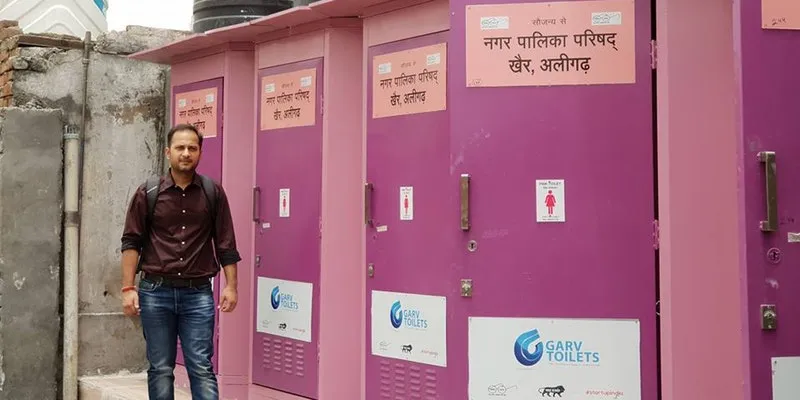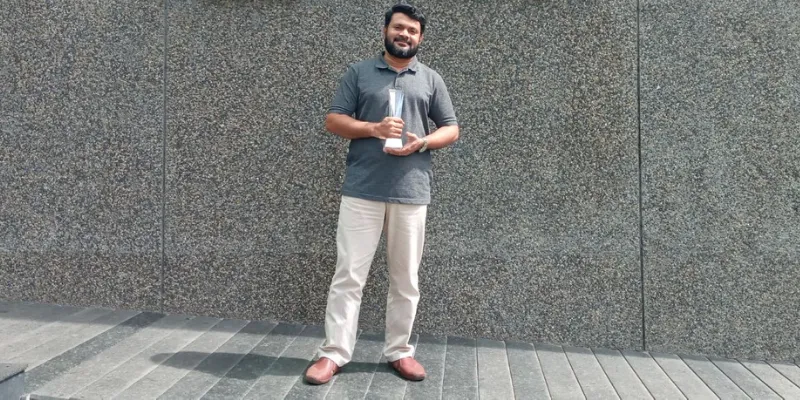[Year in Review 2019] From building IoT-based toilets to tackling pollution, social startups that made headlines
SocialStory brings you a list of startups who have made the headlines in 2019 with their innovative solutions to create an impact across various social sectors.
As 2019 comes to an end, there have been many innovations led by startups in the social sector. From spacetech startups using satellites to address the environmental issues to startups building innovative solutions to educate the underprivileged children.
Amid the rising number of startups today, SocialStory brings you the startups who changed the world across all the social verticals in 2019.
Sistema.bio
Alex Eaton founded is focussed on producing clean energy. Its product, biodigester is a system that turns organic waste into methane-rich biogas. The system uses naturally occurring bacteria within the sealed, anaerobic ‘reactor’ to breakdown animal manure and other farm waste.

The by-products of this process include biogas which is used for cooking, heating, and to generate electricity. It can also be used as a safe and potent organic fertiliser in local farms. The system displaces the cost of traditional fuel allowing for sustainable mechanisation and increased crop yields.
In India, Sistema.bio has partnered with CInI and has conducted a technology trial in Gujarat in 2017. The startup has worked with more than 60 households and impacted over 500 lives in Gujarat, in three months. Its technology has helped to displace 299 tons of carbon dioxide while saving 123 trees annually.
Uthhan
In 2012, Leemon Ravi founded Uthhan, an online ecommerce platform that allows tribal artisans to market and sell their products. To keep the transaction fair and transparent, 95 percent of the proceeds from sales go directly to the artisans with no middleman eating into the amount.

To date, Uthhan has sold over 15,000 products created by more than 3,000 tribal artisans on its platform and is helping to generate a regular income for 1,000 artisans.
Let’s Feed Bengaluru
Started in 2015 and led by 26-year-old Harshil Mittal, Let’s Feed Bengaluru drive feeds over three lakh people across five cities, with donations from over 4,000 registered donors and volunteers.
Harshil, along with his friends Selina Elias, Ashutosh Sharma, and Rishiom Shah have also conducted citizens' drive where they have collected and distributed over 20,000 sets of clothes, 60,000 sanitary napkins, and stationery kits.

Volunteers of the team
The initiative has a system that tags each household or donor to a volunteer, making it easier for the volunteers to keep track. The system also ensures if food is reaching those who need it.
Kriya Labs
Kriya Labs, a startup incubated at the IIT-Delhi has developed a technology that can convert agro-waste like rice straw into pulp, and further process it to make biodegradable cutlery.
Founded by Ankur Kumar, Kanika Prajapat, and Pracheer Dutta, Kriya Labs aims to create a market for rice straw by assigning a commercial value to it. It is expected to reduce the instances of burning rice straw, thereby contributing to a decline in pollution levels in the region.
1559644808395.png?fm=png&auto=format)
The co-founders of Kriya Labs are working on turning agro-waste into useful products.
The yield of the machinery is 70 percent which translates into 0.7 tonnes of pulp from one tonne of rice straw, capable of producing 70 pieces of tableware.
Log 9 Spill Containment
Mumbai-based startup Log 9 Spill Containment has developed oil sorbent pads called Sorbene, which is made from graphene, an allotrope of carbon whose high elasticity and hydrophobic nature makes it difficult to get wet and absorbs oil from water bodies.
In the last five months, the startup has sold more than 30,000 pads that can absorb oil, petrochemicals, and other hydrocarbon-based liquids up to 86 times its weight.

From L to R: Askhay Singhal, Pankaj Sharma and Kartik Hajela.
According to Dhananjay Sharma, Director and CEO, Log 9’s oil sorbent pads have higher removal efficiency than conventional products, are reusable, and safe to dispose of, or incinerate.
Bleetech Innovations
According to the latest Census data, there are about 29 lakh Indians who are differently-abled. Of this, about 12.6 lakh have a hearing impairment of one form or another.
Since 2015, Bleetech has impacted the lives of over 12,000 deaf individuals through its digital platforms, and currently, it is looking to reach out to a large section of the deaf community.
With such an issue waiting to be addressed, 26-year-old industrial designers, Nupura Kirloskar and Janhavi Joshi co-founded Bleetech Innovation.

Jahnavi Joshi (left) and Nupura Kirloskar, the Co-founders of Bleetech Innovations.
The startup’s key offerings are two technological interventions – BleeTV, a free Android mobile application and web portal hosting a pool of content in Indian Sign Language (ISL), and BleeTV Library – a similar platform with content curated especially for children.
To date, Bleetech Innovations has collaborated with seven schools in Pune. Under the initiative, the schools are asked to set aside two hours every week for the children to learn from videos on the platform.
Sepoi
Mumbai-based startup Sepoi gathers army uniforms and turns it into trendy designer laptop bags, backpacks, and handbags with the help of rural women and artisans.
Founded by husband-wife duo, Siddharth Jaiswal (34) and Suchi Jaiswal (33) in 2018, the startup has sold over 110 bags in 2018 and has saved many army uniforms from reaching the garbage dump.

Sepoi co-founders Siddharth Jaiswal and Suchi Jaiswal.
Sepoi’s product line comprises a whole range of bags made from a combination of leather and military surplus. Also, it employs artisans from across the country to upcycle the bags. All the bags are handmade and are priced anywhere between Rs 1,000 and Rs 3,000.
Once processed, the finished products are sent to Sepoi’s fulfilment centre where they are packed in carry bags made from recycled materials. These reusable bags are made by marginalised women associated with the NGO - Shaktishali Mahila Sangathan Samiti (SMMS), using plastic and paper waste.
SMV Green Solutions
Varanasi-based social enterprise SMV Green Solutions is promoting sustainable transport among rickshaw-pullers by enabling them to switch from hand-pulled tricycles to electric rickshaws.

A woman after buying an e-rickshaw as part of SMV Green's Vahini initiative.
Founded by Naveen Krishna (37) in 2015, the startup helps rickshaw-pullers move to EVs through a spectrum of support strategies – from mobilising the community and assisting them to access micro-finance, to handling the purchase and delivery of the three-wheeler, fulfilling the registration process, obtaining insurance, and training them in steering the vehicle.
Annie - Thinkerbell Labs
Deriving its name from Helen Keller's teacher, Anne Sullivan, Annie by , is a device specifically designed to solve the pain-point of low Braille literacy rate among the visually-impaired, by helping them learn how to read, write, and type in Braille.

The typing follows a universal design, based on the standard Braille script. The output is then digitised, making the feedback loops quicker and evaluation easier.
The content for learning is curated to make it suitable for all age-groups, and the medium of instruction is not limited to any language but, extends to accents like UK English and US English.
GARV Toilets
Mayank Midha and Megha Bhatnagar Midha co-founded GARV Toilets which has built 721 toilets in India. The husband-wife duo, apart from India, has also made an impact across four countries including Ghana, Nigeria, Bhutan, and Nepal.

Mayank Midha posing beside a GARV toilet setup
While these toilets are user and disabled-friendly, meaning they come in Western and Indian style, the entire structure is portable and vandal-proof.
Blue Sky Analytics
To help various stakeholders and experts in tackling pollution, or BSA, co-founded by Abhilasha Purwar and Kshitij Purwar, is a downstream value-provider in the data analytics market and aims to serve various industries with insights and better decision-making tools.

The Team
The startup’s indigenous product, BreeZo – an air quality data analytics platform shows macro-level, low-resolution data. If a user wishes to go deeper and micro with high resolution, there is a cost attached to the offering. BreeZo is a free web and mobile product.
Skymet
Noida-based spacetech startup Skymet is addressing inflation in food prices, and farmer suicides through accurate weather predictions, which can go a long way in mitigating this crisis.
To solve this issue, Skymet, founded by Jatin Singh, has installed over 7,000 AWS (Automated Weather Stations) to generate real-time weather and crop monitoring data to extrapolate weather parameters in the near term.

An AQI of Delhi a week ago.
Also, Skymet has real-time weather-based advice which allows a farmer to make time-sensitive decisions regarding crops, irrigation methods, pesticides, fertilisers, etc.
Currently, Skymet is present in 20 Indian states, mostly in the western and southern parts of the country. The startup also uses satellite data for agri-insurance.
To date, Skymet has helped more than 20 million farmers across India. Besides, it has also installed 300 field-based air quality monitors in 55 cities to track PM 2.5 and PM 10 particles.
QuickOBook
Founded by Biswajit Paul in 2016, is a healthcare platform like but, catering exclusively to the needs of the rural population.

Quickoboook Founder Biswajit Paul
The patient management software connects hospitals, doctors, and clinics with patients, while its cloud server, called QOB Connect, also stores the medical history, prescription, and test results of the patient.
Since 2016, the platform has grown from 10 doctors to over 600, with over one lakh people utilising its services.
Aindra
Founded in 2012 by Adarsh Natarajan (40), has successfully helped diagnostic centres and laboratories screen 700 women using its device for cervical cancer across rural Karnataka.

Adarsh Natarajan, Founder, Aindra Systems.
These are built using an AI-based computational pathology system driven by a set of algorithms.
Krimanshi
Based out of Jodhpur and founded by Nikhil Bohra in 2015, converts food and agricultural waste into low-cost feed and fodder for dairy farmers.
In the last four years, Krimanshi has helped over 500 farmers across Rajasthan to increase milk production and reduce veterinary costs. It has also helped the environment by generating value from 100 tonnes of waste (500 to 1,000 kilograms per day).
The startup is also trying to solve the price disparity between cattle feed and milk

Nikhil Bohra, Founder and CEO of Krimanshi.
Spark Astronomy
Founded in 2018 by 19-year-old Aryan Mishra, Spark Astronomy is a Delhi-based startup that helps schools set up dedicated laboratories for astronomy.

The equipment at the Astronomy lab.
Aryan and his team of two approach various schools to raise awareness about the importance of astronomy labs, and also offer to help them set it up.
BigPA Initiative
BigPA uses textile waste to make felt spectacle cases, floor-protecting devices, and coasters, which are not only attractive but eco-friendly. Founded by 18-year-old Raena Ambani, BigPA is fighting for two important causes - women empowerment and waste management.

Raena Ambani
Unbind
Started by architect Vinay Varanasi in 2015, Unbind is a design education startup that serves two major purposes – bridging the gap between design education and practice and creating social impact through design.

Vinay Varanasi, the Founder of Unbind Education.
Unbind has conducted over 120 workshops, from single-day sessions and two-day maker space festivals to weeklong immersion programmes. Focussing on creating an impact on design students’ lives, the startup has worked with over 450 students from institutes across the country, curating different design experiences for them.
HW Design Labs
Founded by Jayakrishnan AL, has come up with a Disaster Warning Broadcast System to aid rescue operations by bridging communication gaps in the event of calamities.

Jayakrishnan AL, Founder and Director, HW Design Labs.
The company is mainly focussed on designing and developing hardware systems for wireless connectivity solutions, advanced tracking, and navigation services.
One of its flagship products is the FM RDS-based (Radio Data Service) Disaster Warning Broadcast System, which consists of a hardware device and a mobile application.
Barefoot Edu Foundation
Founded by Jonathan Mendonca and Saumya Aggarwal, Barefoot Edu Foundation is working to transform educational spaces into stimulating learning environments that are contextualised for under-resourced communities.

Barefoot Edu Foundation Co Founders, Jonathan Mendonca and Saumya Aggarwal taking a session
Currently, the foundation is operational in Mumbai and Haryana. It has also revived early-stage education in about 10 low-fee private schools in Mumbai, and has trained 1,400 Anganwadi workers in the Karnal district of Haryana, with the support of the state government.
(Edited by Suman Singh)

![[Year in Review 2019] From building IoT-based toilets to tackling pollution, social startups that made headlines](https://images.yourstory.com/cs/5/4e0288202dda11e9b78a8b7eb69eb573/Untitleddesign-2019-12-31T204257-1577805182795.jpg?mode=crop&crop=faces&ar=2%3A1&format=auto&w=1920&q=75)





